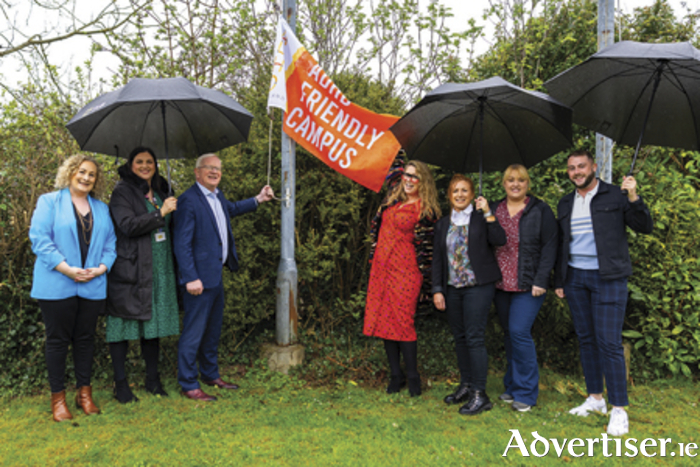Technological University of the Shannon (TUS ) has become the first university in Ireland to be officially designated an ADHD-friendly university by ADHD Ireland.
This recognition follows the roll-out of ADHD Ireland’s ADHD-Friendly University Programme across TUS’s campuses, aimed at promoting awareness, understanding, and practical strategies to support neurodiverse students in tertiary education.
The ADHD Ireland programme, which addresses the stigma and misconceptions surrounding ADHD, equips TUS staff with the knowledge and tools to recognise and support students with ADHD effectively.
It includes comprehensive training sessions for both staff and students.
To celebrate this achievement, TUS held a flag-raising ceremony and certificate presentation for staff who have completed the training, attended by ADHD Ireland National Service Development Manager Nicola Coss.
“We are delighted to accredit TUS as Ireland’s first ADHD-Friendly University and to work with TUS to create an environment of acceptance and understanding of ADHD.
“We were very impressed with uptake across the teams and, having completed various levels of this training staff, are empowered with the knowledge and tools needed to effectively support students in their care.
“Within their part of the programme training, TUS students will be equipped with coping strategies to deal with their daily challenges, both academically and socially, overall improving their mental health and positively impacting their life outcomes,” Ms Coss said.
ADHD, a neurological disorder affecting approximately five percent of the population in Ireland, presents challenges related to impulse control, focus, and organisation; statistically, for every class of 30 students, one will have ADHD.
However, with proper diagnosis and treatment, individuals with ADHD can reach their full potential and achieve great success.
TUS President Professor Vincent Cunnane expressed his pride in TUS achieving ADHD-friendly university status, underscoring the university’s commitment to creating an inclusive environment where every student can thrive.
“The designation of TUS as Ireland’s first ADHD-friendly university signifies a significant step towards creating a more supportive and inclusive educational environment for neurodiverse students. We are proud to raise the flag across our campuses as a symbol of our commitment to creating an equal, diverse, and inclusive institution—a place where every student feels supported, valued, and empowered to achieve their fullest potential,” he said.
TUS has seen significant increases in the number of students with ADHD registering with its disability support services over the last four years with a 130 percent increase noted in the Midlands.
TUS Midlands Disability Officer Lisa Hanlon emphasised the importance of fostering understanding and acceptance of neurodiversity within the university community.
“Each year, we see an increase in the number of students with ADHD registering with the Disability Support Service at TUS. The upward trend in applications for support coupled with requests for information on accessing ADHD assessment, suggests an even wider prevalence of ADHD within the student population.
“It is imperative that we continue to foster a robust understanding of neurodiversity within TUS where students with ADHD feel understood and accepted. Embracing neurodiversity is not just a goal; it’s a philosophy that speaks to our institutional responsibility to fostering a culture of inclusivity and empathy, benefiting the entire university community,” Ms Hanlon added.
TUS already offers a range of supports and services specific to the needs of its neurodiverse students, including a special toolkit aimed at helping students with autism navigate the transition to university life and designated “quiet spaces” on campus, fitted out with specialist furniture which promote a sense of calm, reducing anxiety and stress.
Soon, TUS aims to offer more diverse social spaces to support students, including neurodiverse students, manage stress and combat sensory overload while on campus.

